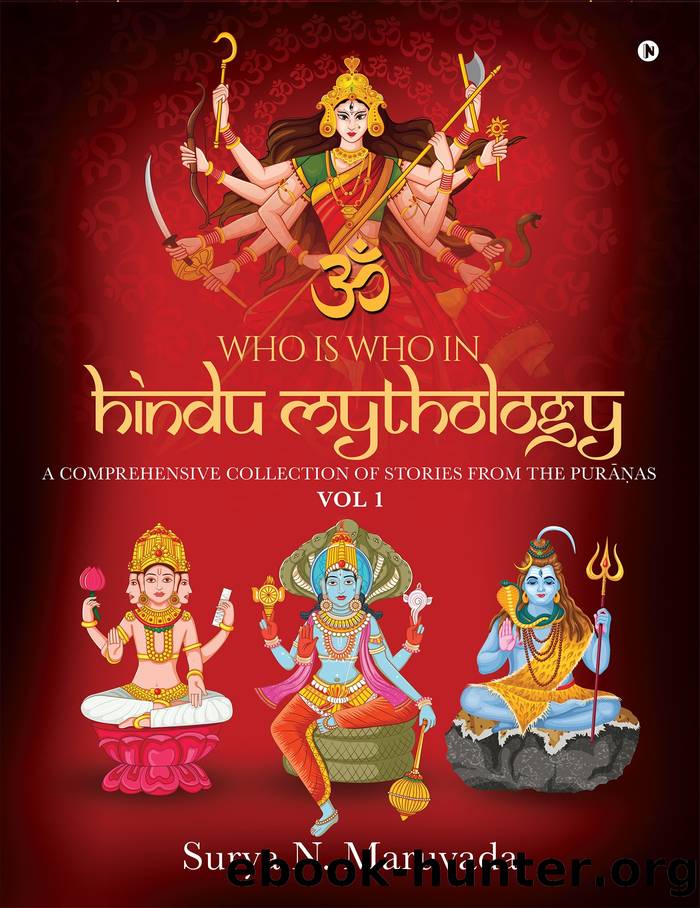Who is Who in Hindu Mythology - VOL 1 by Surya N. Maruvada

Author:Surya N. Maruvada
Language: eng
Format: epub
ISBN: 9781648056840
Publisher: Notion Press
– E –
Ēkachakrapura – A city. An Asura* named Bakāsura was harassing the city’s population. To avoid annihilation by him, the people agreed to send one person each day to be his meal. After escaping being burnt to death in the wax house (one of Duryōdhana’s plots to kill them), the Pānḍavas entered the city, disguised as Brahmins. Bhīma (second oldest of the Pānḍavas) killed Bakāsura here. Mahā Bhārata
Ēkādaṣa Rudras – Sanaka, Sanandana and their brothers (whom Lord Brahma had commanded to propagate the human species), foreswore sex and took vows of celibacy. Creation was stopped in its tracks. Brahma, angry that the population was not growing, and with the intent to resume creation, took both female and male forms Himself. He then separated His form into two. The male then divided into Ēkādaṣa (eleven) men. They were the Ēkādaṣa Rudras. Mārkanḍēya Purāṇa
They were born to Surabhi by Mārtānḍa. Their names were Ajapāda, Ahirbudna, Tryambaka, Vṛshākapi, Ṣambhu, Japāli, Raivata, Hara, Bahurūpa, Ugra, and Viṣvarūpa. Mahā Bhārata
Lord Brahma created Mānasa Putras (mind-born sons) and directed them to procreate. They refused and went their way. When Brahma became angry, Ēkādaṣa Rudras were born from His brow. Their names were Mahat, Mahātma, Matimanta, Bhīshaṇa, Bhayankara, Ṛtadhwaja, Ūrdhvakēṣa, Pingaḷāksha, Ruchi, Ṣuchi, and Kālāgni Rudra. Brahma Vaivarta Purāṇa
Ēkalavya I – Commander of the army of Jarāsandha (an evil king who was an enemy of Lord Kṛshṇa). When Kṛshṇa and Balarāma (His older brother) were on the Gōmanta mountain, he placed dry leaves all around the mountain and set fire to them. Kṛshṇa and Balarāma were able to escape unharmed. Bhāgavata
Ēkalavya II – Chief of an aboriginal tribe named Nishāda. He went to war against Dwāraka (Kṛshṇa’s capital) on behalf of Paundraka Vāsudēva (another enemy of Lord Kṛshṇa). Uttara Harivamṣa
Ēkalavya III – Son of a tribal chief named Hiraṇyadhanva. Having heard of the famous Drōṇa (Guru of Kaurava and Pānḍava princes), he approached the great Guru hoping to learn archery from him. But Drōṇa rejected him as a disciple because of his Nishāda (non-Aryan, tribal, hunters, fishermen, robbers) origin. Taking his leave of Drōṇa, he went back to the forest, made a clay statue of Drōṇa, and considering the statue as a Guru, learnt archery by his own effort. Once, the Kauravas and Pānḍavas came for a hunt to the forest where Ēkalavya lived. When their dog saw Ēkalavya and started barking, Ēkalavya shot an arrow into the dog. The Pānḍavas, coming on the scene on hearing the dog’s cries, were amazed at his skill at archery. They went back and informed Drōṇa that there was an archer in the forest who was better than Arjuna. Drōṇa went to the forest to see Ēkalavya for himself. Ēkalavya greeted him with respect and devotion and showed him how he learnt archery with Drōṇa as a virtual Guru. Drōṇa then asked Ēkalavya for Guru Dakshiṇa*. Ēkalavya said, “My body and all my possessions are yours. I will give whatever you desire.” Drōṇa asked for the right thumb of Ēkalavya.
Download
This site does not store any files on its server. We only index and link to content provided by other sites. Please contact the content providers to delete copyright contents if any and email us, we'll remove relevant links or contents immediately.
Fingersmith by Sarah Waters(2536)
Kundalini by Gopi Krishna(2180)
Wheels of Life by Anodea Judith(2146)
Indian Mythology by Devdutt Pattanaik(1937)
The Bhagavad Gita by Bibek Debroy(1929)
The Yoga of Jesus: Understanding the Hidden Teachings of the Gospels by Paramahansa Yogananda(1861)
Autobiography of a Yogi (Complete Edition) by Yogananda Paramahansa(1825)
The Man from the Egg by Sudha Murty(1812)
The Book of Secrets: 112 Meditations to Discover the Mystery Within by Osho(1675)
Chakra Mantra Magick by Kadmon Baal(1638)
The Sparsholt Affair by Alan Hollinghurst(1585)
Sparks of Divinity by B. K. S. Iyengar(1532)
Gandhi by Ramachandra Guha(1528)
Avatar of Night by Tal Brooke(1521)
Karma-Yoga and Bhakti-Yoga by Swami Vivekananda(1492)
The Bhagavad Gita (Classics of Indian Spirituality) by Eknath Easwaran(1488)
The Spiritual Teaching of Ramana Maharshi by Ramana Maharshi(1432)
Hindoo Holiday by J. R. Ackerley(1378)
Hinduism: A Very Short Introduction (Very Short Introductions) by Knott Kim(1374)
